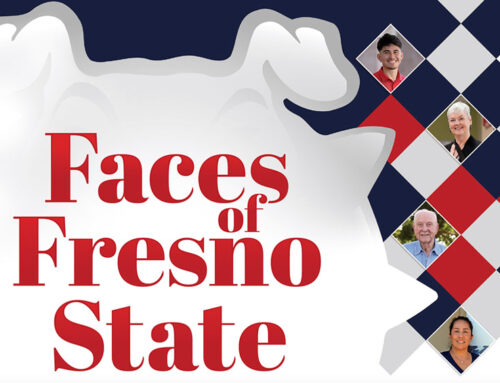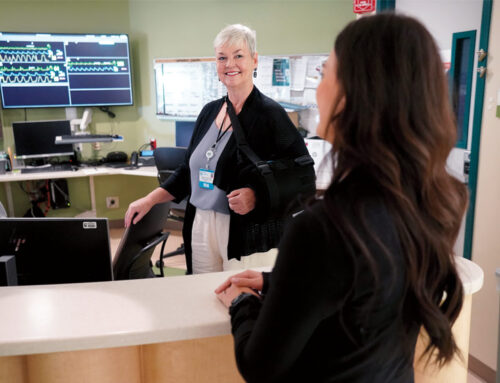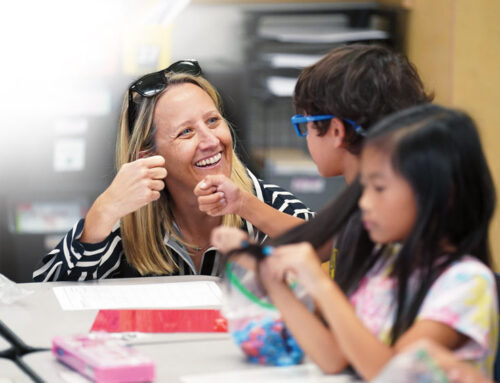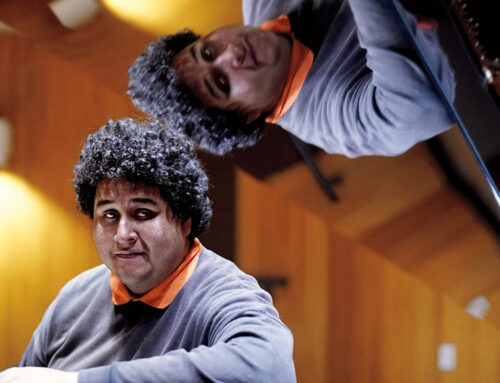Looking Forward
Challenges come and go, but a degree lasts a lifetime
By Eddie Hughes | Photos by Cary Edmondson
 Vivica Thomas briskly runs through the golden hills of Woodward Park, building up her stamina as the sun sets on another day in the life of a college student in this new, mostly virtual norm. She seldom strays off path, hoping to avoid any obstacles on her journey — while armed with the confidence that she has overcome challenges before.
Vivica Thomas briskly runs through the golden hills of Woodward Park, building up her stamina as the sun sets on another day in the life of a college student in this new, mostly virtual norm. She seldom strays off path, hoping to avoid any obstacles on her journey — while armed with the confidence that she has overcome challenges before.
This run is part of her training regimen to stay in shape for her job in the U.S. Army Reserve. But it also symbolizes her educational journey and the determination that keeps her striding forward in her quest to finish college.
This year, along with the COVID-19 pandemic, has brought about change pretty much everywhere for everyone — higher education included. There’s been an unprecedented use of the word “unprecedented” as college students all over the country have transitioned to mostly virtual learning. Many university employees continue to work remotely and, on many campuses, major events like commencement and college sports are in limbo.
For students, questions abound. “Where should I live?” “Which college should I attend, or should I attend college at all?” “Maybe it’s best to take some time off?” “Is college even worth it?”
What is the value of a college degree?
It’s not a new question, but it is one many are considering as they help their loved ones map out their college and career choices in today’s climate.
While the decision about where to attend college may be difficult, experts say the choice about whether to attend should be easy — even amidst a global pandemic.
“The value of a college degree gets questioned for a number of reasons, and the pandemic is surely one of them,” says Shae Collins, communications manager for the Campaign for College Opportunity, an organization that works to ensure all Californians have an equal opportunity to attend and succeed in college.
“In challenging times, a college degree becomes even more valuable,” Collins says. “Usually in these times, people with a college degree weather the storm a lot better. They have more opportunity and more resources that can safeguard against long-term unemployment.”
The stats are seemingly endless. Go to college, earn a degree and it will equate to more opportunity and more money over the course of a lifetime.
A 2018 study by Georgetown University’s Center for Education and the Workforce shows the median earnings for someone with a high school diploma are $36,000 annually, compared with $62,000 for a bachelor’s degree holder and $80,000 for a graduate degree holder. Over the course of a lifetime, that could add up to as much as $1 million in increased earnings.
“Not only is college worth it, the consequences of not going to college have been increasingly dire for people for quite some time,” says Jamie Merisotis, president and CEO of the Lumina Foundation.
“The value of a college degree improves both the quality of your life and the quality of your work.”
Fresno State President Joseph I. Castro serves on the boards of both the Campaign for College Opportunity and the Lumina Foundation, a national, private foundation based in Indianapolis. The Lumina Foundation’s mission is to make opportunities beyond high school available to everyone and prepare informed citizens.
“Value exists for individuals, but also for us as a society,” Merisotis says, pointing out that college graduates are often more active participants in society and in our democracy. “If they make more money, they pay more taxes.”
A 2012 report published by the Campaign for College Opportunity shows for every $1 the state of California invests in public higher education, the state will return $4.50 from taxes on the increased earnings of college graduates and lower costs for providing safety net services.
Social Mobility
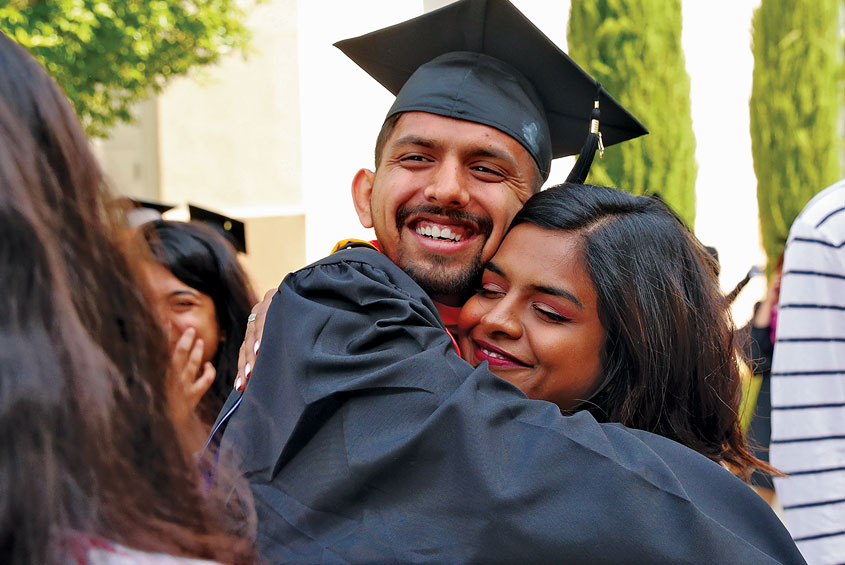
Furthermore, there is perhaps no greater driver of social mobility — the movement of individuals or families between social classes — than a college degree. For those who grow up poor, earning a degree provides a 90% chance of escaping poverty, according to Pew Charitable Trusts.
“Social mobility dramatically improves when one person in the family gets a college degree,” Merisotis says. “I’m a first-generation college graduate myself. Me getting a college degree ended poverty in my family forever.”
This is a particularly powerful narrative at Fresno State, where 80% of students rely on some sort of financial aid and 66% are the first generation in their families to attend college.
For five straight years, the University has ranked among Washington Monthly’s top 30 nationally based on social mobility, research and civic engagement. Money Magazine ranked Fresno State No. 7 nationally among Most Transformative Colleges, “where students beat the odds by doing better than would be expected from their academic and economic backgrounds.”
Those rankings are something all Fresno State alumni can be proud of, and, for this issue, Fresno State Magazine reached out to three people — a recent graduate, a current student and an established alumnus who runs a business — to get their various perspectives on the value of their Fresno State educations.
A Rising Recent Grad
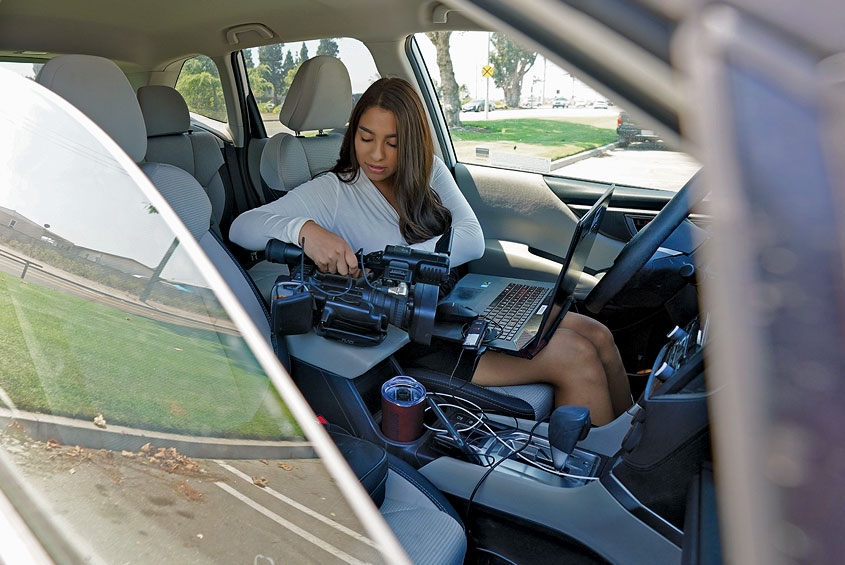
Sometimes trial by fire is the best way to learn when starting a new job. For Gina Avalos, the idiom was a bit too literal. She spent her first day on the job as a multimedia journalist for KSBY TV helping to cover breaking news as a raging fire disrupted the scenic ocean views along California’s Central Coast.
Avalos graduated from Fresno State in May with a degree in media, communications and journalism. The final two months of her college experience were flipped upside down by the COVID-19 pandemic, as her classes shifted to virtual instruction. “The spring semester did not go at all how I planned,” Avalos says. “It was definitely challenging, but I pushed through.”
That’s what Avalos was raised to do. She grew up in Huron, a town of about 7,300 people less than an hour’s drive from Fresno. She was raised by her mother Griselda Lizarraga, a farmworker, in a single-parent household, and she says she also maintained a good relationship with her father. Avalos is the only one of six siblings so far to earn a college degree.
“Coming from where I come from, although people have the opportunity, a lot of people don’t take it,” Avalos says of her decision to go to college.
Avalos once spent a summer working in the tomato fields as a junior at Coalinga High School, and learned how grueling the days could be. “As I was growing up, I would see my mom come home super tired from working long hours in the heat,” Avalos says. “It’s not a job I wanted to do for the rest of my life, although I respect it a lot.”
She remembers the joy she discovered taking a journalism class as a high school elective. Then she attended West Hills College and briefly considered transferring to the University of Miami before learning about Fresno State’s media, communications and journalism program, and opting to stay closer to home.
The value of a Fresno State education was too good to pass up. One of the most affordable universities in the nation, Fresno State was ranked No. 23 by Washington Monthly in the Best Bang for the Buck: West category for how well it helps non-wealthy students attain marketable degrees at an affordable price.
She was determined to take full advantage of her opportunity at Fresno State, saying “yes” to every conference, workshop and on-the-job opportunity she got during college — absorbing the teaching of faculty who spent decades in TV news, working on the Fresno State Focus student newscast and working as a student assistant producing content for the University’s official social media accounts.
Those experiences helped Avalos land a job right out of college, even during a time of uncertainty and job scarcity.
“[They] had me editing, interviewing and shooting all the time, which is something I’m doing every day now,” Avalos says. During the pandemic, while using her company vehicle as her roaming office, Avalos is sent out on assignment five days a week. She typically sets up her own tripod and video camera and records herself reporting on scene, before editing the footage in her vehicle and uploading
it to the station for the evening news.
It’s a daily grind she’s grown to love. Her goal is to one day become a news anchor and possibly return to the Fresno area. But, for now, she’s focused on learning from the news pros she works with every day and gaining all the experience she can. Her career serves as a reminder of the value of her degree and the experiences Fresno State provided that helped her land that first job.
“During these times, it’s so important to have that education,” Avalos says. “The best thing you can do is to be educated and informed. If you can make it through the pandemic as a college student, you can do anything.”
Now, she’s counting down the days until she officially receives her degree in the mail.
“To me, the value of having that degree in my hand is being able to say I’m a first-generation student, and I’m proud of that,” Avalos says. “It just shows how much hard work and determination gets you. I just can’t wait to get my degree and frame it and show it off — and to get that reaction from my parents.”
A Student Story — Staying the Course

The American Council on Education projected in April that fall enrollment at universities nationwide would decrease by 15%. Fresno State’s enrollment actually grew — perhaps a testament to the value of an affordable education at a University that serves a student population like Fresno State’s.
“For first-generation students, for low-income students, for students of color, the degree matters so much more,” says Shae Collins, of Campaign for College Opportunity. “These are students who typically don’t have as much of a safety net, students who can’t afford to take time off. There’s so much more value for those students because there aren’t many opportunities for upward mobility aside from college.”
Fresno State welcomed the largest incoming class in its history this fall with about 3,700 freshmen and almost 2,800 transfer students. Total enrollment for the 110th academic year exceeds 25,000 students.
One of those students is Vivica Thomas, an Africana studies major who transferred from Fresno City College.
Thomas’ story is one of perseverance and inspiration that she hopes will encourage other students facing barriers to earning their degrees. Though she doesn’t yet know exactly what career her schooling will lead her to, she is unwavering in her goal to finish what she started and graduate just as her four sisters did.
Her father, who served in the U.S. Navy for 18 years, has pennants on the family room wall of the family’s Stockton home representing each college his daughters have attended.
The Fresno State pennant is the third for Thomas, who initially attended Cal State East Bay before Fresno City College. Like many college students, unexpected obstacles have dotted Thomas’ path.
She left East Bay after a difficult living situation, and enrolled at Fresno City College when her sister, Olivia, moved to town. That same semester, Thomas was diagnosed with a learning disability after another sister, Sheila, a doctor, suggested she get tested for reading comprehension. With access to services and support, Thomas says her grades went up tremendously.
While progressing in school, however, she also needed a job. A U.S. Army recruiter visiting Fresno City College convinced Thomas to come meet with him, and within about a month’s time, she says, she was being sworn in to the U.S. Army Reserve. Her parents were not surprised.
“My family is involved in all my decisions, down to what color shoes I wear. We’re very close,” Thomas says. “They were not shocked because out of all five of us [children], I’m the most likely to do something like that. Dad was in the Navy 18 years, one of us had to do it. It was inevitable.”
Serving as a mechanic (she wanted a job that would tech her a skill), Thomas reported to Joint Forces Training Base Los Alamitos once a month. That was pre-pandemic. Now, her training mostly consists of computer courses and meetings, while she runs four days a week to stay in shape. On top of that, she moved into her first apartment in August, and she has started styling hair out of her home to help make ends meet.
She is enrolled in 15 units, and is somewhat nervous about a fall semester requiring virtual instruction — which she knows will require a lot of reading rather than the face-to-face interaction she thrives with. “I thought about not attending school this semester, but at the end of the day I can either [persevere] this one semester (hopefully it’s just one semester) or I can be doing [nothing] with my time,” Thomas says.
“The biggest thing I’ve learned in my college journey, if you have an academic goal, don’t let anything discourage you from achieving that goal — if it’s a learning disability, if it’s your friends, if you lose your job, whatever. If you have a goal, stay focused on your goal.”
An Alumnus Perspective
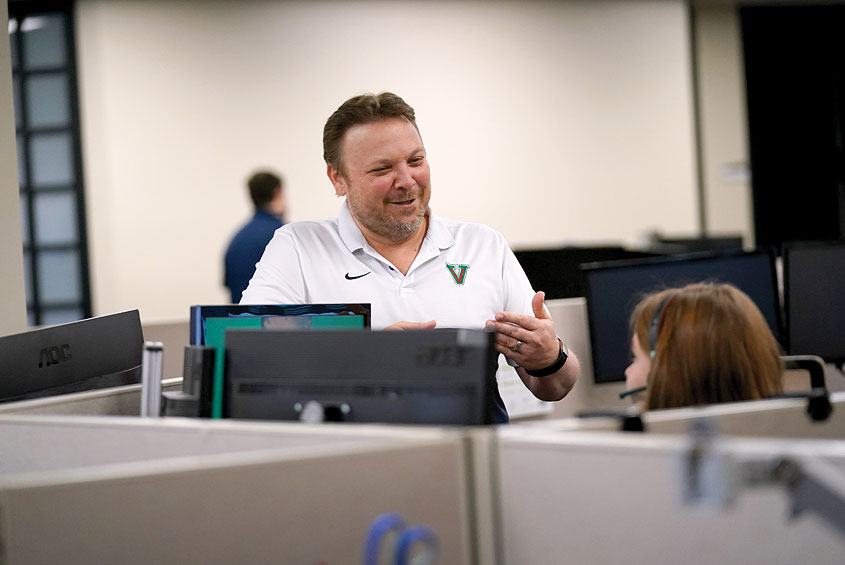
From media coverage to casual conversations, it’s been hard not to pick up on chatter about a “gap year” or whether students should consider taking some time off, during the past few months of the pandemic and the adapting college landscape.
Barry Maas has some personal experience with the topic, from way before it was trending. Maas, a 1994 Fresno State graduate, grew up in South Dakota and attended South Dakota State University his first two years of college before his father relocated to Fresno. Maas ended up transferring to Fresno State, and took a gap year to gain residency and qualify for in-state tuition.
It worked for him nearly 30 years ago, but may not work for many students today, experts say. The biggest concern is that students who take time off, might never come back. “It took me five years total, but I didn’t want to stop where I was,” Maas says. “I can see where it would be easy to not go back, but you’re dealing with an interim issue that’s temporary. I would remind people we’re in a remote environment, but it keeps you focused, it keeps you engaged. It’s always better to stay engaged so you don’t miss out on an opportunity down the road.”
It’s also important to consider that today’s college student isn’t necessarily between the ages of 18 to 22, and may already be working to support a family while pursuing an education. “A gap year is fine for a very narrow slice of people, people who have economic capacity and family support to be able to do that,” says Jamie Merisotis of the Lumina Foundation. “For most people, it’s not a realistic prospect. Many people have lost their jobs, are facing economic dislocation, and this idea of taking time off is very unrealistic.”
By 2030, 60% of adults in the state must have a college degree to meet workforce demand, close racial equity gaps and maintain the state’s economic standing, according to a 2018 report by the Campaign for College Opportunity. That means California will need to dramatically pick up the pace to produce 1.65 million more college degrees than are currently projected.
Some of those degree recipients may come to work for Maas, who founded Administrative Solutions, Inc., a third-party benefits administrator, in 2001. It started out with him and one other employee and has grown to about 100 employees. The Fresno-based business merged with Navia Benefit Solutions in 2019.
Maas says the value of a college degree is learning critical thinking. “Critical thinking is important, and that’s a skill that the more education you get, the better you’re going to be at it,” says Maas, who earned Fresno State’s Top Dog Alumni Award in 2019.
“There’s tremendous value for me, personally. What I do on a day-to-day basis isn’t necessarily what I went to school for, but between running a business, marketing, HR, the value in a degree for me was being able to think through and analyze all the day-to-day decisions you have to make as a business owner.”
Most of the Administrative Solutions team works in claims processing and data entry positions that don’t require a degree, but many of his managers have degrees, including about 10 Fresno State alumni.
The University is special to Maas for many reasons. He met his wife, Peggy, at a Bulldogs basketball game in 2000, and they have long supported the Bulldog Foundation. The couple has also donated to the Renaissance Scholars Program to support students who experienced foster care or homelessness, and the President’s Circle of Excellence.
“My good fortune rests on a lot of different shoulders,” Maas says. “Some of it was working hard, but many others I encountered in my life gave me inspiration and showed me there are ways to be successful. They’re instrumental in everything I’ve done, including Fresno State, which is why I support it in a big way.”


